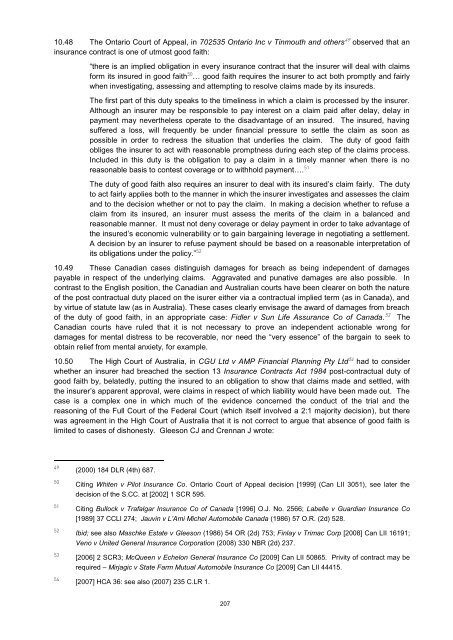Insurance Contracts CP - Law Reform Commission
Insurance Contracts CP - Law Reform Commission
Insurance Contracts CP - Law Reform Commission
You also want an ePaper? Increase the reach of your titles
YUMPU automatically turns print PDFs into web optimized ePapers that Google loves.
10.48 The Ontario Court of Appeal, in 702535 Ontario Inc v Tinmouth and others 49 observed that an<br />
insurance contract is one of utmost good faith:<br />
―there is an implied obligation in every insurance contract that the insurer will deal with claims<br />
form its insured in good faith 50 … good faith requires the insurer to act both promptly and fairly<br />
when investigating, assessing and attempting to resolve claims made by its insureds.<br />
The first part of this duty speaks to the timeliness in which a claim is processed by the insurer.<br />
Although an insurer may be responsible to pay interest on a claim paid after delay, delay in<br />
payment may nevertheless operate to the disadvantage of an insured. The insured, having<br />
suffered a loss, will frequently be under financial pressure to settle the claim as soon as<br />
possible in order to redress the situation that underlies the claim. The duty of good faith<br />
obliges the insurer to act with reasonable promptness during each step of the claims process.<br />
Included in this duty is the obligation to pay a claim in a timely manner when there is no<br />
reasonable basis to contest coverage or to withhold payment…. 51<br />
The duty of good faith also requires an insurer to deal with its insured‘s claim fairly. The duty<br />
to act fairly applies both to the manner in which the insurer investigates and assesses the claim<br />
and to the decision whether or not to pay the claim. In making a decision whether to refuse a<br />
claim from its insured, an insurer must assess the merits of the claim in a balanced and<br />
reasonable manner. It must not deny coverage or delay payment in order to take advantage of<br />
the insured‘s economic vulnerability or to gain bargaining leverage in negotiating a settlement.<br />
A decision by an insurer to refuse payment should be based on a reasonable interpretation of<br />
its obligations under the policy.‖ 52<br />
10.49 These Canadian cases distinguish damages for breach as being independent of damages<br />
payable in respect of the underlying claims. Aggravated and punative damages are also possible. In<br />
contrast to the English position, the Canadian and Australian courts have been clearer on both the nature<br />
of the post contractual duty placed on the isurer either via a contractual implied term (as in Canada), and<br />
by virtue of statute law (as in Australia). These cases clearly envisage the award of damages from breach<br />
of the duty of good faith, in an appropriate case: Fidler v Sun Life Assurance Co of Canada. 53 The<br />
Canadian courts have ruled that it is not necessary to prove an independent actionable wrong for<br />
damages for mental distress to be recoverable, nor need the ―very essence‖ of the bargain to seek to<br />
obtain relief from mental anxiety, for example.<br />
10.50 The High Court of Australia, in CGU Ltd v AMP Financial Planning Pty Ltd 54 had to consider<br />
whether an insurer had breached the section 13 <strong>Insurance</strong> <strong>Contracts</strong> Act 1984 post-contractual duty of<br />
good faith by, belatedly, putting the insured to an obligation to show that claims made and settled, with<br />
the insurer‘s apparent approval, were claims in respect of which liability would have been made out. The<br />
case is a complex one in which much of the evidence concerned the conduct of the trial and the<br />
reasoning of the Full Court of the Federal Court (which itself involved a 2:1 majority decision), but there<br />
was agreement in the High Court of Australia that it is not correct to argue that absence of good faith is<br />
limited to cases of dishonesty. Gleeson CJ and Crennan J wrote:<br />
49<br />
50<br />
51<br />
52<br />
53<br />
54<br />
(2000) 184 DLR (4th) 687.<br />
Citing Whiten v Pilot <strong>Insurance</strong> Co. Ontario Court of Appeal decision [1999] (Can LII 3051), see later the<br />
decision of the S.CC. at [2002] 1 SCR 595.<br />
Citing Bullock v Trafalgar <strong>Insurance</strong> Co of Canada [1996] O.J. No. 2566; Labelle v Guardian <strong>Insurance</strong> Co<br />
[1989] 37 CCLI 274; Jauvin v L‟Ami Michel Automobile Canada (1986) 57 O.R. (2d) 528.<br />
Ibid; see also Maschke Estate v Gleeson (1986) 54 OR (2d) 753; Finlay v Trimac Corp [2008] Can LII 16191;<br />
Veno v United General <strong>Insurance</strong> Corporation (2008) 330 NBR (2d) 237.<br />
[2006] 2 SCR3; McQueen v Echelon General <strong>Insurance</strong> Co [2009] Can LII 50865. Privity of contract may be<br />
required – Mirjagic v State Farm Mutual Automobile <strong>Insurance</strong> Co [2009] Can LII 44415.<br />
[2007] HCA 36: see also (2007) 235 C.LR 1.<br />
207

















